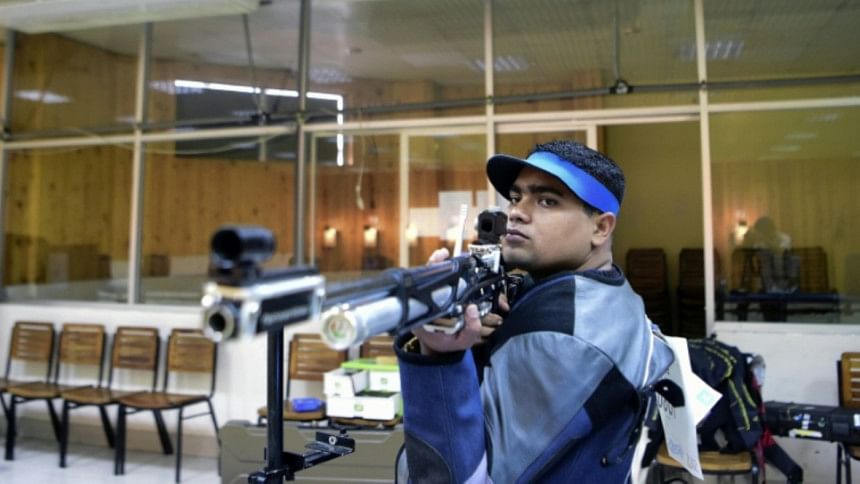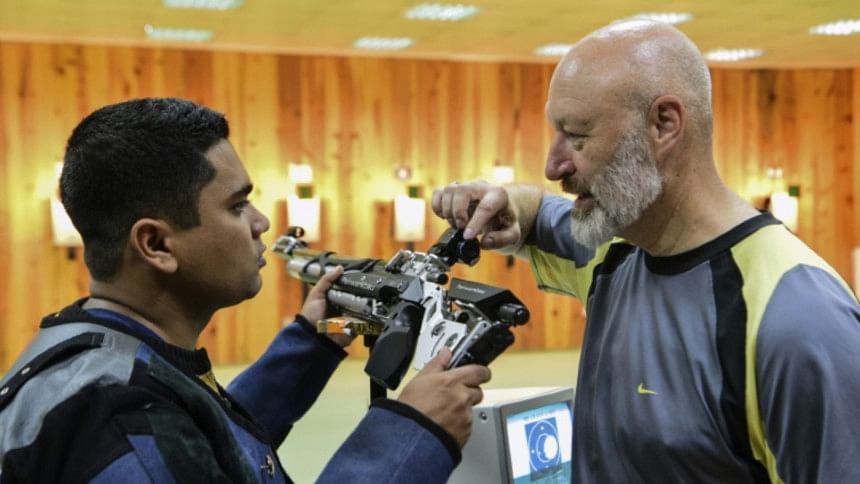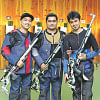Baki takes aim at Olympics medal drought

An Olympics triumph can make you a hero in any country but legendary status awaits Abdullah Hel Baki if he can finally rid Bangladesh of an unwanted distinction -- the biggest nation never to win a medal.
Despite being home to nearly 160 million people, nobody from Bangladesh has ever even qualified for an Olympics -- their competitors have all been wildcard entries -- let alone reached the podium.
Athletes and administrators admit they face huge obstacles to win medals, including a lack of facilities and funding, along with an overriding obsession with the non-Olympic sport of cricket.
But after becoming the first Bangladeshi to gain a berth at Rio, Baki -- a shooter who won the 10 metre air rifle silver at the 2014 Commonwealth Games -- hopes to finally give his compatriots something to shout about.
"Every athlete dreams of taking part and doing well in the Olympics and that's my aim as well," he told AFP during a break in training at the national shooting federation.
"If I can perform the way I'm doing in training, I hope to reach the finals and then I'll definitely be in the hunt for a medal."
Baki just missed out on automatic qualification but his performance at the recent world cup in Munich, where he was on the leaderboard for much of the tournament before tailing off at the end, secured him an early wildcard.
'National legend'
Even if he is a long shot for a medal in Brazil, his Danish coach Klavs Christensen says the future looks bright for Baki and Bangladeshi shooting.
"There's huge talent here," said Christensen, describing Baki's biggest challenge as replicating his impressive performances on the practice range at big events.
He also detailed how a lack of facilities, including an indoor 50-metre range to complement an existing 10-metre range, was holding his shooters back.
"There's a lot of things we can improve on... but I'm pretty sure that in the next four years, at the Olympics in Tokyo in 2020, there could be a very strong Bangladeshi team."

Determined to end the medal drought, Bangladesh's Olympic association is dangling major incentives for its Games squad which is also expected to include swimmers, athletes and archers.
"Anyone who wins gold will get 10 million taka (around $125,0000), silver five million and bronze 2.5 million," the association's director general Fakhruddin Haider told AFP.
"Whoever wins the first medal will definitely become a national legend."
Haider is particularly excited about the prospect of golfer Siddikur Rahman becoming the first Bangladeshi to qualify for an Olympics by right.
Rahman nearly secured a spot at a recent tournament in Mauritius, before blowing his lead by double-bogeying two of the last three holes.
If he can cling on to his place in the top 60 of an Olympics rankings list, he will join the likes of Australia's Jason Day and the American Jordan Spieth on the Rio fairways.
But as a professional, Rahman is an exception to the norm in Bangladesh as for him, funding is not really an issue.
"Professionalism hasn't really come to Bangladesh," said Haider.
"If I'm a sportsman then I can't feed my family. It's only in cricket where sportsmen can really earn money."
Barefoot and borrowed shoes
Nazmun Nahar Beauty, who represented Bangladesh in the women's 100 metres at the 2008 Beijing Olympics, outlined the problems amateurs such as herself faced.
"There are only two astro-turf running tracks here which we don't have easy access to and we can't practice year-round as there are no indoor facilities," she told AFP.
"I remember running barefoot in my first national championships and there were times when I had to borrow shoes to take part in other meets.
"We also don't have (an) electronic scoreboard which is vital to get an accurate picture of whether you're improving or not."
Prime Minister Sheikh Hasina has given instructions for a Olympic-standard training village to be built close to Dhaka, but that is still at the planning stage.
For Baki, the focus is on the more immediate future in Rio as he sharpens his preparations for the 10-metre air rifle event.
"The scores I'm getting in practice would be good enough to get into the final round and I'm sure if I can reach the final I can be a tough competitor... and have a good chance of a medal," he said.
"If that happens, the entire narrative changes and we'll have more people getting into shooting, raise our profile and get an international-standard range.
"For me, it's not really about stardom but trying to do something for my country."

 For all latest news, follow The Daily Star's Google News channel.
For all latest news, follow The Daily Star's Google News channel. 




Comments